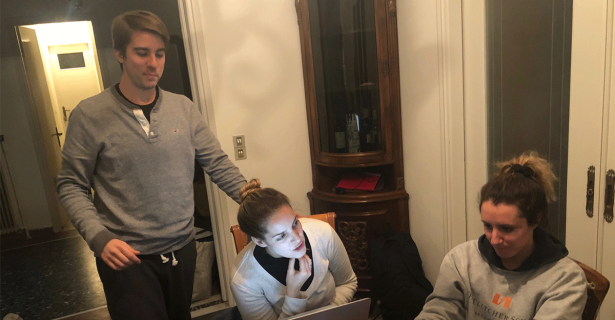My time in Lesvos came to an end in January, and my experience is difficult to put in writing. First, I was not prepared for the changes in camp conditions from when I left in August. Every inch of space both inside and surrounding Moria camp is used as some sort of shelter for newly arriving asylum seekers. People often find communities within their nationalities or language to share tents or spaces. Of course, not everyone is able to make this happen and there are men, women and children left to fend for themselves without access to even the barest of resources, including a tent.
What I found most startling was the number of unaccompanied minors on the island of Lesvos since I left. An unaccompanied minor is a child who arrives without their parents. Some children arrive with other family members, but the majority have made the harrowing journey to Greece on their own. As of the day I left, there were 1,074 unaccompanied children seeking asylum. Although there are spaces inside Moria built to house these children, those spaces have long been at maximum capacity (and over). These children are forced to figure out how to meet their day-to-day needs alone, and many sleep in parks, on beaches, or in tents with adults they do not know. We had many children come to our clinic who had no socks, no jackets and the barest of shoes. I was not prepared for this before I came, and it stands out as one of the most jarring changes I witnessed.
My time spent as coordinator of the clinic, while my colleagues took a much-needed break, was chaotic as ever but incredibly fulfilling. Aside from coordination, I was able to take on the legal preparation case for a female client. It was great to be back doing something that I love, with an organization that I truly believe in.
Late in 2019, the Greek government announced an overhaul of the legal asylum process for those who arrive in Greece. Implementation of the new law began January 1, 2020 and has impacted the lives of asylum seekers greatly. At Fenix, we spent hours trying to digest and analyze the new law in order to ensure we are up to date with changes that impact our clients. We spent time strategizing with other legal actors to understand exactly what procedural changes would be implemented. As it is early days, Fenix lawyers are checking day-by-day to see how the asylum process will be handled pursuant to the new law. Moria is everchanging, but this overhaul has been the most complicated and unclear adjustment to the process that I have experienced. It will remain to be seen how our clients’ lives will be impacted, but Fenix is diligently monitoring the situation.
Leaving the island a second time was more emotional than the first. As the team gathered on my last night to say goodbye, I was surprised at how sad I was to leave. Fenix has become a family to me, and I will miss everyone that works there not only as a colleague, but as a friend. For the members of Fenix who are themselves seeking asylum, saying goodbye is particularly difficult. As the situation changes daily, I don’t know when or if I will be able to see people again.
The future of the asylum seekers on the island of Lesvos is incredibly uncertain, and politics in the European Union will play a huge role. Other European states have largely refused to host significant populations of asylum seekers that arrive to Europe in border states like Greece. At present, the living conditions in Moria make it more important than ever for host countries to address the humanitarian crises at the borders of Europe.
Fenix Humanitarian Legal Aid plays a huge role for asylum seekers in Lesvos, with a small staff and budget. For more information, please see: https://www.fenixaid.org/donate

